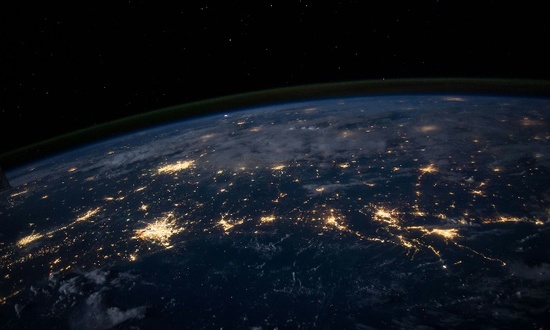سيمر كل واحد منّا بالألم؛ وكثيرون يختبرونه الآن بالفعل. فالشرَّ حقيقةٌ في عالمنا، حاضرٌ وقريبٌ من كلِّ واحدٍ منا.
الخبر السار هو أن الله جعل وسيلة لإنقاذنا، بعد موتنا، من كل شرٍّ وألمٍ. نستطيع أن نتيقَّن من كوننا سنذهب إلى السماء حين نموت: "كَتَبْتُ هَذَا إِلَيْكُمْ، أَنْتُمُ ٱلْمُؤْمِنِينَ بِٱسْمِ ٱبْنِ ٱللهِ، لِكَيْ تَعْلَمُوا أَنَّ لَكُمْ حَيَاةً أَبَدِيَّة" (1 يوحنا 5: 13). فيما يلي ملخَّصٌ لما يُطلق عليه الله "البشارة":
إن ارتكاب الخطية يعني الإخفاق في استيفاء مقاييس الله المقدَّسة: "إِذِ ٱلْجَمِيعُ أَخْطَأُوا وَأَعْوَزَهُمْ مَجْدُ ٱللهِ" (رومية 3: 23). والخطية تفصلنا عن العلاقة مع الله (انظر إشعياء 59: 2). كما أن للخطية عواقب وخيمة، لكن الله قد أوجد الحل: "لِأَنَّ أُجْرَةَ ٱلْخَطِيَّةِ هِيَ مَوْتٌ، وَأَمَّا هِبَةُ ٱللهِ فَهِيَ حَيَاةٌ أَبَدِيَّةٌ بِٱلْمَسِيحِ يَسُوعَ رَبِّنَا" (رومية 6: 23).
هكذا أحبَّنا يسوع المسيح، ابن الله، حتى أنه صار إنسانًا كي يخلِّصنا (انظر يوحنا 3: 16). عاش يسوع حياة بلا خطية (انظر عبرانيين 2: 17-18؛ 4: 15-16). ومات كي يسدِّد ثمن العقوبة عن خطايانا (انظر 2 كورنثوس 5: 21). فعلى الصليب، أخذ يسوع على عاتقه الجحيم الذي نستحقه، كي يشتري لنا السماء التي لا نستحقها. وحين مات، قال: "قَدْ أُكْمِلَ" (يوحنا 19: 30)، مستخدمًا الكلمة اليونانية نفسها التي تعبِّر عن إلغاء سند الدين؛ أي بمعنى "قد دُفع الثمن كاملًا". ثم قام يسوع من القبر، غالبًا الخطية، وقاهرًا الموت (انظر 1 كورنثوس 15: 3-4، 54-57).
كم عدد الطرق التي يمكن أن نسلكها للوصول إلى الآب الذي في السماء؟ كرز بطرس قائلًا: "لَيْسَ بِأَحَدٍ غَيْرِهِ [أي يسوع] ٱلْخَلَاصُ. لِأَنْ لَيْسَ ٱسْمٌ آخَرُ تَحْتَ ٱلسَّمَاءِ، قَدْ أُعْطِيَ بَيْنَ ٱلنَّاسِ، بِهِ يَنْبَغِي أَنْ نَخْلُصَ" (أعمال الرسل 4: 12).
"قَالَ لَهُ يَسُوعُ: «أَنَا هُوَ ٱلطَّرِيقُ وَٱلْحَقُّ وَٱلْحَيَاةُ. لَيْسَ أَحَدٌ يَأْتِي إِلَى ٱلْآبِ إِلَّا بِي»" (يوحنا 14: 6). هذا تصريح قاطع وحصري، لكنَّ قد أدلى به يسوع. فهل تصدِّقه؟
يقدِّم لنا الله مجانًا الغفران في المسيح: "لَمْ يَصْنَعْ مَعَنَا حَسَبَ خَطَايَانَا، وَلَمْ يُجَازِنَا حَسَبَ آثَامِنَا ... كَبُعْدِ ٱلْمَشْرِقِ مِنَ ٱلْمَغْرِبِ أَبْعَدَ عَنَّا مَعَاصِيَنَا" (مزمور 103: 10، 12). وكي ننال الغفران، لا بد أن نتوب: "إِنِ ٱعْتَرَفْنَا بِخَطَايَانَا فَهُوَ أَمِينٌ وَعَادِلٌ، حَتَّى يَغْفِرَ لَنَا خَطَايَانَا وَيُطَهِّرَنَا مِنْ كُلِّ إِثْمٍ" (1 يوحنا 1: 9).
"لِأَنَّكَ إِنِ ٱعْتَرَفْتَ بِفَمِكَ بِٱلرَّبِّ يَسُوعَ، وَآمَنْتَ بِقَلْبِكَ أَنَّ ٱللهَ أَقَامَهُ مِنَ ٱلْأَمْوَاتِ، خَلَصْتَ" (رومية 10: 9)
لن تربح لنا أعمال البر مكانًا في السماء (تيطس 3: 5). ولا يمكن أن يُنسَب لنا أيُّ فضلٍ في الخلاص: "لِأَنَّكُمْ بِٱلنِّعْمَةِ مُخَلَّصُونَ، بِٱلْإِيمَانِ، وَذَلِكَ لَيْسَ مِنْكُمْ. هُوَ عَطِيَّةُ ٱللهِ. لَيْسَ مِنْ أَعْمَالٍ كَيْلَا يَفْتَخِرَ أَحَدٌ" (أفسس 2: 8-9).
يقدِّم المسيح لكل إنسانٍ هبة الغفران والحياة الأبدية: "مَنْ يَعْطَشْ فَلْيَأْتِ. وَمَنْ يُرِدْ فَلْيَأْخُذْ مَاءَ حَيَاةٍ مَجَّانًا" (رؤيا 22: 17).
إن لم تكن قد قبلتَ هذه العطية المقدَّمة لك من المسيح، والتي كلَّفته هذا الثمن الباهظ، فما الذي يمنعك؟ أما إن كنتَ قد قبلتَ بالفعل دعوة الله للخلاص، فهو سيخلصك من الألم الأبدي، بل واليوم أيضًا سيعطيك عربونًا مُبهجًا من الحياة في محضره.
في أسوأ وأحلك لحظاتك، ليتك تتذكر مكانتك وحالتك الحقيقية والأبدية في المسيح: فقد جاء مخلِّصك كي ينقذك، وهو يصلِّي لأجلك بأنَّات، وقد ضمن لك قيامتك وحياتك الأبدية، وهو معك وليس عليك، ويجعل كل الأشياء تعمل معًا لخيرك، ولا يسمح البتة تحت أي ظرف أن يفصلك شيء عن محبته. هذا هو مصدر الرجاء الحقيقي والدائم، حتى في عالم من الألم والشر.
يوجّه هذا الرجِّاء أعيننا نحو الضوء الموجود في نهاية نفق الحياة. وهو لا يجعل النفق مُحتمَلًا فحسب، لكنه أيضًا يملأ القلب بتوقع وانتظار لما يوجد على الجانب الآخر: عالمٌ نابض بالحياة، جديد، ورائع، بلا ألم، أو معاناة، أو حرب. عالمٌ بلا مرض، وبلا حوادث، وبلا مآسٍ. عالمٌ بلا طغاة أو مخبولين. عالمٌ يحكمه الشخص الوحيد الجدير بأن يملُك (انظر رؤيا 5: 12). ومع أننا لا نعلم بالتحديد متى يكون هذا، لكننا على يقين من أن معاناتنا سوف تنتهي، سواء بموتنا أو بمجيء المسيح ثانية. فمن قبل البدء، رسم الله خط نهاية الألم على مشارف الأبدية كي يقول بهذا لأبنائه: "يكفي هذا القدر، ثم أمامكم فرح لا ينتهي".
لْيَمْلَأْكُمْ إِلَهُ ٱلرَّجَاءِ كُلَّ سُرُورٍ وَسَلَامٍ فِي ٱلْإِيمَانِ، لِتَزْدَادُوا فِي ٱلرَّجَاءِ بِقُوَّةِ ٱلرُّوحِ ٱلْقُدُسِ (رومية 15: 13).
Is There Any Hope with All of the Evil and Suffering in This World?
Every one of us will experience suffering. Many are experiencing it now. Evil is real in our world, present and close to each one of us.
The good news is that God has made a way to deliver us from all evil and suffering after we die. We can know for sure we’ll go to Heaven when we die: “I write these things to you who believe in the name of the Son of God so that you may know that you have eternal life” (1 John 5:13). Here’s a summary of what God calls “the Good News”:
To sin means to fail to meet God’s holy standards. “All have sinned and fall short of the glory of God” (Romans 3:23). Sin separates us from a relationship with God (see Isaiah 59:2). Sin has terrible consequences, but God has provided a solution: “The wages of sin is death, but the gift of God is eternal life in Christ Jesus our Lord” (Romans 6:23).
Jesus Christ, God’s Son, loved us so much that He became a man to deliver us (see John 3:16). Jesus lived a sinless life (see Hebrews 2:17–18; 4:15–16). He died to pay the penalty for our sins (see 2 Corinthians 5:21). On the cross, He took upon Himself the Hell we deserve, in order to purchase for us the Heaven we don’t deserve. When He died, He said, “It is finished” (John 19:30), using the Greek word for cancelling certificates of debt; it meant “paid in full.” Jesus then rose from the grave, defeating sin and conquering death (see 1 Corinthians 15:3–4, 54–57).
How many routes can take us to the Father in Heaven? Peter preached, “Salvation is found in no one else [but Jesus], for there is no other name under heaven given to men by which we must be saved” (Acts 4:12).
“Jesus answered, ‘I am the way and the truth and the life. No one comes to the Father except through me’” (John 14:6). That’s an exclusive statement, but Jesus made it. Do you believe Him?
God freely offers us forgiveness in Christ: “He does not treat us as our sins deserve or repay us according to our iniquities.... As far as the east is from the west, so far has he removed our transgressions from us” (Psalm 103:10, 12). To be forgiven, we must repent: “If we confess our sins, he is faithful and just and will forgive us our sins and purify us from all unrighteousness” (1 John 1:9).
“If you confess with your mouth, ‘Jesus is Lord,’ and believe in your heart that God raised him from the dead, you will be saved” (Romans 10:9).
Righteous deeds will not earn us a place in Heaven (see Titus 3:5). We can take no credit for salvation: “For it is by grace you have been saved, through faith—and this not from yourselves, it is the gift of God—not by works, so that no one can boast” (Ephesians 2:8–9).
Christ offers to everyone the gift of forgiveness and eternal life: “Whoever is thirsty, let him come; and whoever wishes, let him take the free gift of the water of life” (Revelation 22:17).
If you have not accepted this gift offered by Christ at such a great price to Him, what’s stopping you?
If you have accepted God’s invitation of salvation, He will deliver you from eternal suffering. And even now He will give you joyful foretastes of living in His presence.
In your darkest moments, may you remember your true, eternal circumstances in Christ: your Savior has come to deliver you, groans as He prays for you, has secured your resurrection and eternal life, is for you and not against you, works all things together for your good, and never under any circumstances allows anything to separate you from His love. That’s the source of true and lasting hope, even in a world of suffering and evil.
Hope points to the light at the end of life’s tunnel. It not only makes the tunnel endurable, it fills the heart with anticipation of what’s at the other end: a world alive, fresh, beautiful, and without pain, suffering, or war. A world without disease, without accident, without tragedy. A world without dictators or madmen. A world ruled by the only One worthy of ruling (see Revelation 5:12). Though we don’t know exactly when, we do know for sure that either by our deaths or by Christ’s return, our suffering will end. From before the beginning, God drew the line in eternity’s sand to say for His children, “This much and no more, then endless joy.”
May the God of hope fill you with all joy and peace as you trust in him, so that you may overflow with hope by the power of the Holy Spirit. —Romans 15:13
Photo by Chelsea London Phillips on Unsplash




